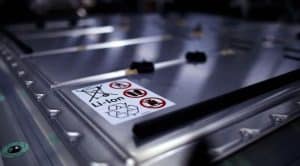
The public is finally buying electric vehicles in substantial numbers, a pivotal step toward decarbonizing transportation. But without changes to how the industry does business, the surge in EVs could eventually leave the planet awash in the batteries that make them run.
Lithium-ion batteries already power phones, laptops, scooters, e-bikes and toothbrushes. But global battery manufacturing is growing rapidly to serve the newly voracious demand for electric cars, which hit a record 8.6 percent of global new car sales in 2021.
Now that the growth trajectory is clear for battery-powered cars, the clean energy industry needs to figure out how to deal with the ensuing waste. Lithium-ion batteries contain materials that shouldn’t be dumped in a landfill, and old batteries can catch fire if they aren’t cared for properly. But so far, battery recycling technology and processing capacity have lagged far behind manufacturing.
It’s possible to pay someone to cart off old batteries and dispose of them as a hazardous waste stream. But this adds cost to the battery life cycle. That’s because traditional methods for breaking down batteries, including pyrometallurgy and hydrometallurgy, are expensive and time-consuming and don’t recapture all of the valuable material inside.
Pyrometallurgy involves chucking batteries into a furnace to burn off much of their content; the smoldering remains get sold to smelters that use the trace nickel and cobalt.
Hydrometallurgy uses chemistry to reclaim metals after mechanically shredding batteries into little bits (see video below). This sometimes requires painstaking manual labor to break down large packs beforehand.
These methods don’t recover anything close to the amount of material needed to make a new battery, even though all the fixings for a new battery exist in an old battery. Old-school recycling facilities often don’t even reclaim the lithium — they just weren’t set up to do that.
Now, though, a number of startups are commercializing cleaner and more efficient recycling techniques, and building dedicated lithium-ion battery recycling factories at an unprecedented scale. Many of the founders come armed with experience they gained from prior stints in battery manufacturing. And in just the last year or two, they’ve raised a boatload of cash from investors who sense an opportunity to make battery recycling profitable.
“I’ve worked in this space for 22 years, and last year looked significantly different than the previous 21,” said Shane Thompson, president of long-running recycling company Retriev Technologies. As for the next decade? “Buckle up,” he said.
Recycling capacity has lagged battery production in part because it takes years of operating an EV before its battery pack needs disposal, and electric vehicles are still a pretty new mass-market trend. But this new cohort of recyclers doesn’t have to wait for electric vehicles to hit critical mass. They’ve got plenty to hone their techniques on with existing consumer electronics waste, plus the scrap from new battery manufacturing.
“It is absolutely a solvable problem,” Li-Cycle CEO and co-founder Ajay Kochhar said of the recycling challenge. “Companies like us exist, and our whole premise is to make this economically and environmentally beneficial.”
Here’s a sampling of five up-and-coming startups making battery recycling more efficient, clean and profitable. If they succeed, they’ll help prepare the world for the EV revolution.
ABTC: Take batteries apart the way they are put together
Instead of shredding or burning batteries, why not run the manufacturing process in reverse?
That’s the elegant insight that informs how the American Battery Technology Company approaches battery recycling. The team there knows how to put batteries together because they helped Tesla set up its Nevada Gigafactory. One of Ryan Melsert’s jobs was to vet prospective recyclers to responsibly dispose of waste from the battery manufacturing process.
“After seeing the state of the industry in North America and how there was such a void of competitive and responsible operations, that’s what led my team and [me] to leave Tesla” and fill that void, said Melsert, now CEO and CTO of ABTC.
Melsert and company decided to enhance battery recycling by programming off-the-shelf manufacturing machines to disassemble instead of assemble. The machines take battery packs and break them back down to cells, and then pick apart the anodes, cathodes and separators.
At that point, the company applies its chemical know-how to extract the materials needed to make new batteries. (The team also uses these techniques to harvest new minerals from the company’s mining operations.) The mechanized process increases the amount of recovered materials while reducing the costs of processing.
“By doing it strategically, we’ve been able to dramatically lower the amount of chemical agents we needed in the separation process,” Melsert said. That reduces a dominant cost of mineral recovery: buying the acids, caustics, solvents and oxidizers that extract useful materials.
ABTC then refines the materials for use in new batteries and sells them as a domestic source of critical minerals.
The company has tested its techniques in lab settings and in high throughput trials at equipment manufacturer sites and currently is building its first pre-commercial-scale plant in Reno, Nevada. That one will take in 20,000 tonnes of batteries per year — if it works, the next plant will use the same extraction technologies and processes at 10 times the scale.
Battery recycling “is solvable, but it still requires putting effort in and building commercial-scale facilities,” he said.
Li-Cycle: Break down whole packs, recycle all the metals
Traditional battery recycling does not revolve around recovering the ingredients to make new batteries. In many cases, the goal is to pull out just the nickel and cobalt and forget the rest. When it comes to EV batteries, though, this approach means wasting the lithium, so a number of startups are experimenting with more thorough processes that allow them to extract this valuable mineral.
“Sometimes these things are obvious, but they just take time to develop and scale up,” Li-Cycle’s Kochhar said.
His company, which has more than 300 employees, opened a factory in Arizona in May that breaks down battery packs in a newly efficient way.
